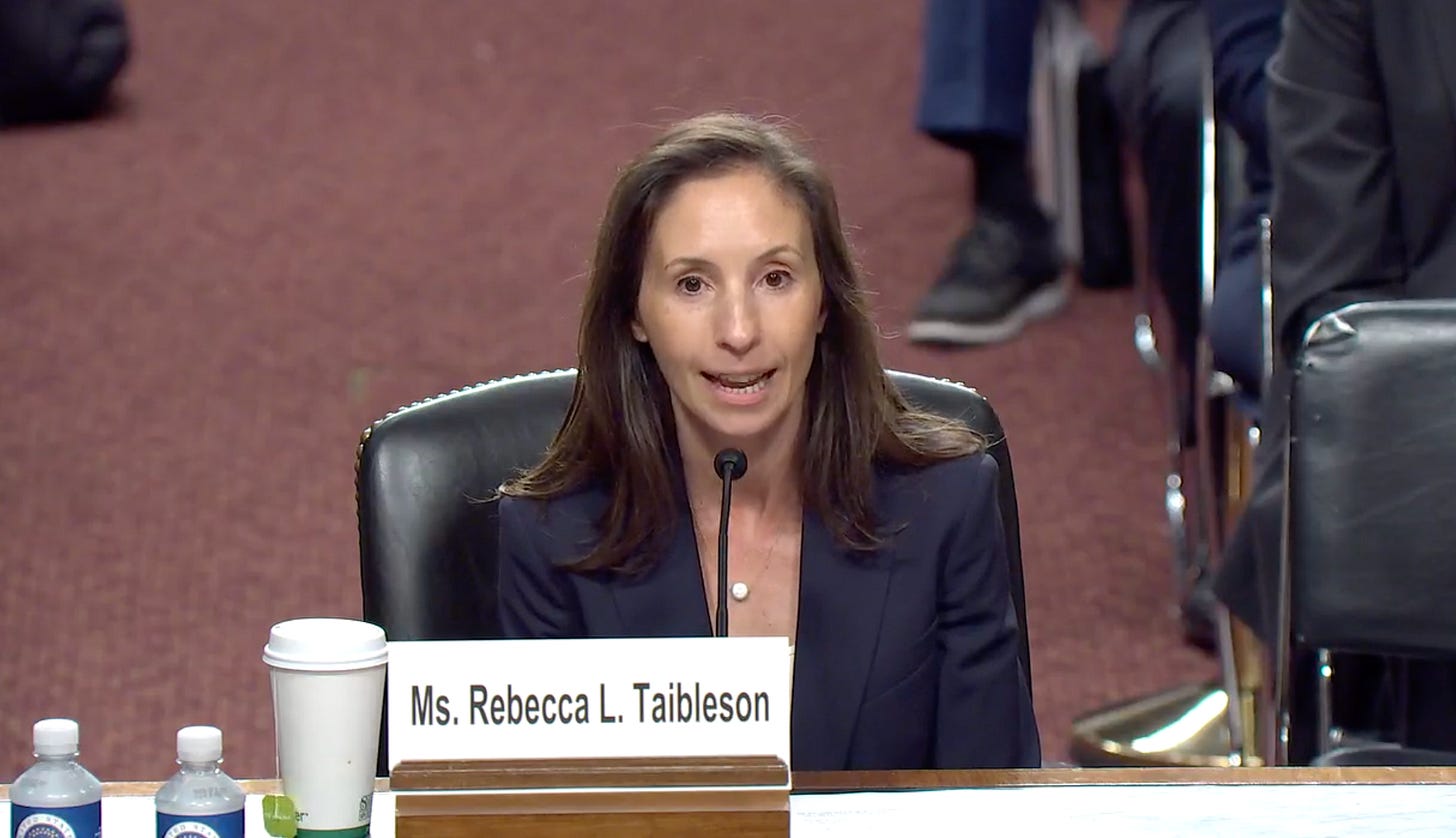The Seventh Circuit Has Only Had Five Judges of Color. Trump’s About to Get His Sixth White Appointee.
His nominations today continue a troubling trend he started during his first term.
The Senate today invoked cloture on the nomination of Rebecca Taibleson to serve on the U.S. Court of Appeals for the Seventh Circuit. If confirmed, she will be the fourth appellate court judge approved by the Senate during Trump’s second term.
Taibleson’s confirmation to a lifetime federal judgeship will threaten civil and human rights for residents of Illinois, Indiana, and Wisconsin, which comprise the Seventh Circuit. As Alliance for Justice told senators in their letter opposing Taibleson’s confirmation, her “record demonstrates that her guiding philosophy is not one of neutrality, but of allegiance to far-right ideologies increasingly supported by Trump. A lifetime appointment would empower her to enshrine those positions into binding precedent for decades to come.”

Her confirmation will also be troubling because it continues a trend that Trump began during his first term: only appointing white judges — and judges who lack professional diversity — to this court.
Background
In 1999, President Clinton appointed Judge Ann Claire Williams to the Seventh Circuit, making her the first judge of color to ever serve on that appellate court. In the years that followed, Presidents Bush and Obama, during their combined 16 years in office, successfully appointed only three additional judges to the Seventh Circuit, and all three were white.
Before he left office, though, President Obama in January 2016 nominated Myra Selby to serve in an Indiana seat on the Seventh Circuit. Selby, who previously became the first Black person and first woman to serve on the Indiana Supreme Court, would be denied a hearing and blocked from consideration by Senator Dan Coats.
When Trump took office the following year, he instead nominated Amy Coney Barrett to that seat. In 2018, he appointed Michael Brennan, Michael Scudder, and Amy St. Eve, who were all confirmed within four days in May. Judge St. Eve was confirmed to the seat held by Judge Ann Claire Williams, who took senior status in 2017 and retired from the bench in 2018. The Seventh Circuit was — once again — all white.
On October 21, 2020, just weeks before the 2020 election and five days before Amy Coney Barrett was confirmed to the Supreme Court, Trump nominated Thomas Kirsch to replace Justice Barrett on the Seventh Circuit. He was ultimately confirmed on December 15, making him the fifth white judge appointed by Trump to a court that became all white again during his administration.
Biden’s appointments
President Biden also appointed five judges to the Seventh Circuit, but they brought vastly different lived experiences and legal backgrounds to the bench.
Biden immediately reintegrated the court, nominating Candace Jackson-Akiwumi in his first slate of judicial nominees on March 30, 2021. Judge Jackson-Akiwumi would become the second judge of color and first former public defender to serve on the court. She also previously clerked for Fourth Circuit Judge Roger Gregory, who himself had integrated what was then the last all-white appellate court in 2000.
President Biden didn’t stop there.
In September 2022, the Senate confirmed Judge John Lee to the court, making him the first Asian American judge to serve on the Seventh Circuit.
In December 2022, the Senate confirmed Judge Doris Pryor to the court, making her the first Black woman from Indiana and second former public defender to serve on the Seventh Circuit.
In July 2024, the Senate confirmed former civil rights lawyer Judge Nancy Maldonado to the court, making her the first Latino/a judge to serve on the Seventh Circuit.
President Biden also appointed Judge Joshua Kolar to the court, who in January 2024 became the 40th circuit court judge confirmed during the Biden administration. By the end of his term, Biden added four judges of color to a court that had only ever had one judge of color — but that had become (and had been kept) all white under Trump.
Where things stand
Rebecca Taibleson’s confirmation will mean that Trump has appointed more white judges to the Seventh Circuit (6) than judges of color who have ever served on the court in the nation’s history (5). This seat also stands out because a judge of color from Wisconsin has never served on the Seventh Circuit, and Trump has made sure it stays that way.
During Trump’s first term he appointed 54 judges to federal circuit courts. None were Black or Native. One was Latina. One was openly LGBTQ+. Only 20 percent (11) were women, and fewer than 4 percent (just two) were women of color. Seven were Asian American (though all seven were opposed by various civil rights and progressive organizations because of their records).
Judicial diversity — both demographic and professional — strengthens our democracy and has been shown to increase public trust in the courts, improve judicial decision-making, and provide for the opportunity for role models. This is obviously not a priority for a president whose agenda is fueled by white supremacy and who is working aggressively to undo the tremendous gains of the civil rights movement. And that is incredibly perilous for our courts and our democracy.

